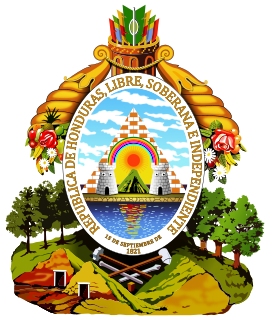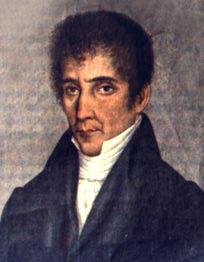
Elections in Bolivia gives information on elections and election results in Bolivia.

The National Party of Honduras is a political party in Honduras founded on February 27, 1902, by Manuel Bonilla Chirinos. Historically it has been one of the two most influential parties in the country. The party's platform is based on Christian humanist doctrine, and its five main principles are common wealth, dignity of the human person, equality, solidarity and subsidiarity.

Terencio Esteban Sierra Romero was President of Honduras between 1 February 1899 and 1 February 1903.

Óscar Acosta Zeledón was a Honduran writer, poet, critic, politician and diplomat.

The Central American Technological University(UNITEC) is a private coeducational institution with campuses in the three main cities of Honduras: Tegucigalpa, San Pedro Sula and La Ceiba.

General elections were held in Honduras to elect a president and parliament on 30 November 1997. They were also the first elections in which the left wing Democratic Unification Party was allowed to stand.
Pumas de la UNAH or simply Universidad was a Honduran football club.
The Honduran general election, 2009 was held in Honduras on November 29, 2009, including presidential, parliamentary and local elections. Voters went to the polls to elect:
The 2009 Honduran constitutional crisis was a political confrontation concerning the events that led to, included, and followed the 2009 Honduran coup d'état and the political breakdown associated with it. The coup was repudiated around the globe, but Roberto Micheletti, head of the government installed after the coup, has claimed that the Honduran Supreme Court ordered the detention of Manuel Zelaya, deposed President of Honduras, and that the following succession was constitutionally valid.
A general election was held in Honduras on 10 October 1954. The elections took place, with relative honesty.

General elections were held in Honduras between 27 and 29 October 1923. Tiburcio Carías Andino won the presidential election with 47.1% of the vote. However, as no candidate had received an absolute majority in the public vote, Congress would vote on the candidates. However, Congress did not meet again until 1 January the following year. In December President Rafael López Gutiérrez declared a state of siege, suspended the constitution, and announced that he would remain in office in order to keep the peace. Although Congress was dominated by the two liberal parties, they did not want Carías, but also could not agree on a common candidate.

General elections were held in Honduras on November 24, 2013. Voters went to the polls to elect a new President, the 128 members of the National Congress, 298 Mayors and vice-mayors and their respective councilors and 20 representatives to the Central American Parliament.
Juan Pablo Wainwright Nuila (1894–1932) was a Honduran revolutionary leader. A former member of the Canadian Army in World War I, he joined the Communist Party in El Salvador in 1928. He was expelled from the country that year, returning to Honduras. He was later identified as one of the major communist agitators in Latin America. After an escape from a Honduran prison in 1930, he was arrested in Guatemala in January 1932. Following a confrontation between Wainwright and Guatemalan dictator Jorge Ubico in a prison office, Ubico ordered Wainwright's execution.

Presidential elections were held in Colombia on May 25, 2014. Since no candidate received 50% of the vote in the first round, a run-off between the two candidates with the most votes took place three weeks later on June 15, 2014. According to the official figures released by the National Registry office, as of May 22, 2014 32,975,158 Colombians were registered and entitled to vote in the 2014 presidential election, including 545,976 Colombians resident abroad. Incumbent president Juan Manuel Santos was allowed to run for a second consecutive term. In the first round, Santos and Óscar Iván Zuluaga of the Democratic Center were the two highest-polling candidates and were the contestants in the June 15 run-off. In the second round, Santos was re-elected president, gaining 50.95% of the vote compared with 45.00% for Zuluaga.

Rafael Manzanares Aguilar was educated in law, a professor and Honduran folklorist, an author and a musical composer. Rafael Manzanares was one of the pioneers in highlighting folklore, culture and national history of Honduras as the creator of the National Folklore Office and the Cuadro Nacional de Danzas Folklóricas de Honduras.

General elections were held in Honduras on 26 November 2017. Voters went to the polls to elect the President of Honduras to serve a four-year term, as well as 128 members of the unicameral National Congress, 20 members for the Central American Parliament and mayors for the municipalities of Honduras.

Ana Rosalinda García Carías is a Honduran lawyer and current First Lady of the nation.
Doris Alejandrina Gutiérrez is a Honduran lawyer and politician. She is currently a Representative in the National Congress of Honduras belonging to the Innovation and Unity Party. In popular Honduran culture, Gutiérrez has the nickname "The Dancing Representative."
William Chong Wong was a Honduran economist, professor and politician. He twice served as Minister of Finance of Honduras, during the administrations of President Ricardo Maduro and President Porfirio Lobo Sosa. He was born in Honduras to Chinese immigrant parents and educated in Spain and the United States. He was a professor at Universidad Nacional Autónoma de Honduras and co-founded the Central American Technological University in 1987.













